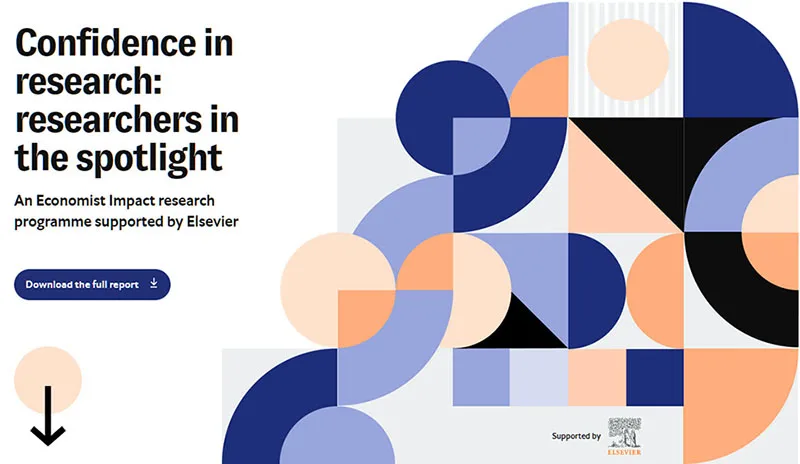Connect: Global collaboration examining confidence in research delivers landmark study by Economist Impact
2022년 11월 8일 | 5분 읽기
저자: Laura Hassink

The report offers insights from 3,000+ researchers into how the pandemic has affected confidence in research and how we can best support researchers.
Sense About Science Director Tracey Brown, OBE, speaks at the UK Confidence in Research roundtable.
The pandemic showed just how important quality research is for addressing global challenges and finding solutions that benefit people everywhere. It accelerated the practice of science and breakthrough, with data shared openly and fast as researchers collaborated across borders, sectors and disciplines. Whether a scientist, healthcare professional, policymaker, regulator or publisher, we were all united around one goal — to save lives. Science became the topic everyone was interested in and wanted to read about and comment on.
On one hand, these shifts present an opportunity for the research community. Researchers can more easily engage and share their expertise with a wider group of people — helping to increase understanding, create collaboration opportunities, and stimulate progress.
On the other hand, these accelerated trends bring challenges. Research is being created in greater quantity, faster than ever before, making identifying information more difficult for researchers and the public alike.
As a scientific publisher and information analytics company, Elsevier has been privileged to play a role, for over 140 years, in helping ensure that research can be trusted, shared and built upon to accelerate progress for society. For the past year, we have partnered with leading organizations dedicated to advancing research and science to initiate a global dialogue about how confidence in research has been affected by the pandemic and to identify practical solutions that can support researchers.
A key part of this has been Economist Impact’s study Confidence in research: researchers in the spotlight 새 탭/창에서 열기, supported by Elsevier, which surveyed more than 3,000 researchers globally, across different career stages and academic disciplines, to understand their experiences, their own confidence in the research process, and what skills, support or incentive structures they need in this increasingly complex and public-facing environment.
In collaboration with Economist Impact, Sense about Science 새 탭/창에서 열기 and our regional convening partners, Elsevier convened a series of roundtables attended by leaders from academic and science institutions and established as well as early-career-researchers in China, Germany, Japan, the Netherlands, the UK and the US. These sessions — along with the scrutiny of a Global Expert Panel from throughout the research ecosystem — helped to interrogate the findings of the survey and, crucially, gather views on where action and intervention are most needed to help researchers.
Here are some of the insights from the research:
Nearly two-thirds of scientific researchers surveyed (63%) think the pandemic has increased public attention on research. But only 38% think that better public understanding of research will be a legacy of the pandemic.
Half of all researchers surveyed (51%) say they feel a responsibility to engage in debate online, and over two-thirds (68%) believe the pandemic has increased the importance of separating quality research from misinformation. Nearly a quarter of respondents (23%) now see publicly countering misinformation as one of their primary roles in society.
Being published in a peer-reviewed journal is the most important marker of reliability according to 74% of researchers surveyed. The study also reveals that more than half of researchers (52%) feel the pandemic increased the importance of publishing research early, prior to peer review
More than half of respondents express concern about the challenges of over-simplification (52%) and the politicization of research (56%) as a result of increased public attention on research and the research process.
Nearly a third (32%) of respondents have experienced, or know a close colleague who has experienced, abuse after posting research online.
So what do the experts consulted believe is needed to address these challenges and pressures? The Economist Impact report summarizes the practical recommendations to support the research community and enhance confidence in research:
Formal communications training to give researchers the tools and guidance to communicate ethically, effectively and with confidence, and incentivizing strong communication skills as part of career development.
by drafting clear codes of conduct and guidance on how to manage online interaction.
Embedding the right incentive and reward structures to ensure that researchers’ contributions to furthering confidence in science receive appropriate recognition, in particular their role in teaching, public engagement and participation in the peer review process.
by providing financial incentives for researchers to collaborate in larger teams and facilitate quality trials and studies over quantity.
by directing research funding to countries and research communities that need it most.
Adopting more digestible summaries and user-friendly formats to make it easier for policymakers, journalists or the general public to better understand and identify quality research.
Prioritizing consistency in R&D spending to ensure that researchers can properly plan their research, staffing and infrastructure needs.
On behalf of everyone at Elsevier, I would like to thank all our partners in this important global collaboration, the many members of the Global Advisory Board and Global Expert Panel, and the thousands of academic leaders, scientists and researchers who contributed their invaluable perspectives to the report.
We believe this report can be a helpful stimulus for further dialogue and, ultimately, for turning recommendations into action. At Elsevier, we are committed to playing our part in supporting the research community to tackle these challenges. We look forward to hearing your views on the research findings, and we welcome your input and ideas on practical steps we can take to improve confidence in research.
기여자

LH
